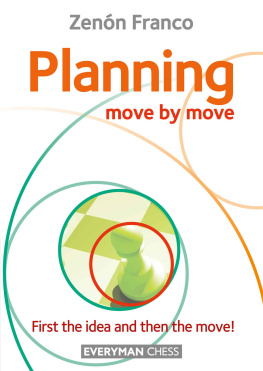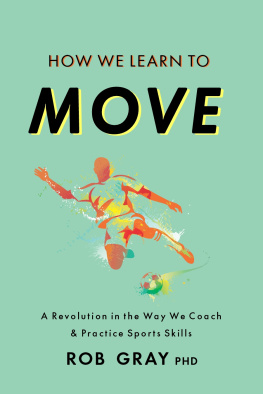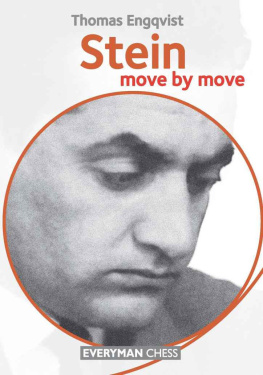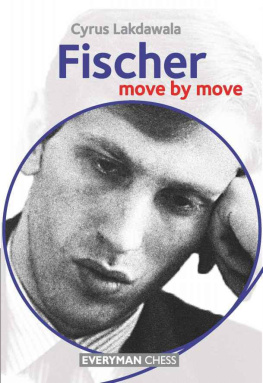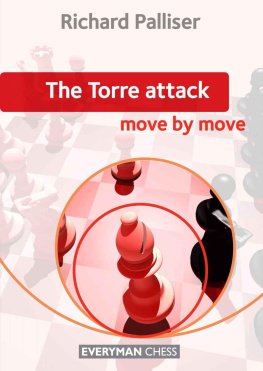Zenón Franco - Planning: Move by Move: First the idea and then the move!
Here you can read online Zenón Franco - Planning: Move by Move: First the idea and then the move! full text of the book (entire story) in english for free. Download pdf and epub, get meaning, cover and reviews about this ebook. year: 2020, publisher: Everyman Chess, genre: Home and family. Description of the work, (preface) as well as reviews are available. Best literature library LitArk.com created for fans of good reading and offers a wide selection of genres:
Romance novel
Science fiction
Adventure
Detective
Science
History
Home and family
Prose
Art
Politics
Computer
Non-fiction
Religion
Business
Children
Humor
Choose a favorite category and find really read worthwhile books. Enjoy immersion in the world of imagination, feel the emotions of the characters or learn something new for yourself, make an fascinating discovery.
- Book:Planning: Move by Move: First the idea and then the move!
- Author:
- Publisher:Everyman Chess
- Genre:
- Year:2020
- Rating:4 / 5
- Favourites:Add to favourites
- Your mark:
- 80
- 1
- 2
- 3
- 4
- 5
Planning: Move by Move: First the idea and then the move!: summary, description and annotation
We offer to read an annotation, description, summary or preface (depends on what the author of the book "Planning: Move by Move: First the idea and then the move!" wrote himself). If you haven't found the necessary information about the book — write in the comments, we will try to find it.
Zenón Franco: author's other books
Who wrote Planning: Move by Move: First the idea and then the move!? Find out the surname, the name of the author of the book and a list of all author's works by series.
Planning: Move by Move: First the idea and then the move! — read online for free the complete book (whole text) full work
Below is the text of the book, divided by pages. System saving the place of the last page read, allows you to conveniently read the book "Planning: Move by Move: First the idea and then the move!" online for free, without having to search again every time where you left off. Put a bookmark, and you can go to the page where you finished reading at any time.
Font size:
Interval:
Bookmark:

First published in 2019 by Gloucester Publishers Limited, London.
Copyright 2019 Zenn Franco
Translation by Phil Adams
The right of Zenn Franco to be identified as the author of this work has been
asserted in accordance with the Copyrights, Designs and Patents Act 1988.
All rights reserved. No part of this publication may be reproduced, stored in a
retrieval system or transmitted in any form or by any means, electronic,
electrostatic, magnetic tape, photocopying, recording or otherwise,
without prior permission of the publisher.
British Library Cataloguing-in-Publication Data
A catalogue record for this book is available from the British Library.
ISBN: 978 1 78194 521 6
Distributed in North America by National Book Network,
15200 NBN Way, Blue Ridge Summit, PA 17214. Ph: 717.794.3800.
Distributed in Europe by Central Books Ltd.,
Central Books Ltd, 50 Freshwater Road, Chadwell Heath, London, RM8 1RX.
All other sales enquiries should be directed to Everyman Chess.
email: info@everymanchess.com; website: www.everymanchess.com
Everyman is the registered trade mark of Random House Inc. and is used in this work under licence from Random House Inc.
Dedicated to Yudania
Everyman Chess Series
Commissioning editor and advisor: Byron Jacobs
Typeset and edited by First Rank Publishing, Brighton.
Cover design by Horatio Monteverde.
Printed by TJ International Limited, Padstow, Cornwall.
About the Author
Zenn Franco is a grandmaster from Paraguay, now living in Spain. He represented Paraguay, on top board, in seven Chess Olympiads, and won individual gold medals at Lucerne 1982 and Novi Sad 1990. Hes an experienced trainer and has written numerous books on chess.
Contents
Bibliography
Books
The worlds championship Chess Match played at Havana Between Jose Raul Capablanca and Emanuel Lasker , Hartwig Cassel and Jos Ral Capablanca, Privately printed, 1921.
Learn from the Grandmasters , Tal, Korchnoi, Larsen & others, Batsford, 1975
Grandmaster Preparation , Lev Polugaevsky, Pergamon Russian Chess, 1980.
Isaac Boleslavsky. Selected Games , Isaac Boleslavsky, Caissa Books, 1988.
Leonid Stein Master of Risk Strategy , Eduard Gufeld and Efim Lazarev, Thinkers Press, Inc. 2001.
Champions friend, Friendships Champion: Lilienthals 100 best games , Andre Lilienthal, Caissa Chess Books, 2001.
School of Chess Excellence 3 , Mark Dvoretsky, Edition Olms 2002.
Smyslovs Best Games Vol 1 & 2, Vassily Smyslov, Chess Agency, CAISSA-90, 2003
My Great Predecessors, Volume 2, 3, 4, 5 , Garry Kasparov, Everyman, 2004, 2005, 2006.
Winning Chess Explained , Zenn Franco, Gambit 2006.
My Sixty Memorable Games , Robert Fischer, Batsford, 2008.
Bobby Fischer. The Career and Complete Games of the American World Chess Champion , Karsten Mueller, Russell Enterprises, 2009.
Mis mejores partidas , Anatoly Karpov, Editorial Hispano Europea 2009.
Magnus Carlsen, rumbo al ttulo mundial , Zenn Franco Ocampos, Ventajedrez 2013.
Magnus Carlsen, Campen del Mundo , Zenn Franco Ocampos, Ventajedrez 2015.
My Secrets in the Ruy Lopez , Lajos Portisch, Gambit 2017.
Grandes Campeones. Fabiano Caruana , Zenn Franco Ocampos, Ventajedrez 2018.
Magazines Databases and Engines
New in Chess Magazine 1984 2019
Mega Database 2019 Chessbase
Chess Informant, 1966-2019
Stockfish 9
Stockfish 10
Introduction
First the idea and then the move! Miguel Najdorf used to say in his habitually enthusiastic fashion. That statement is the perfect summary of planning in chess.
The topic of planning in chess is very broad. It can consist of improving the position of a piece, neutralising an opponents piece, beginning an attack on the king, trying to weaken your opponents structure, improving your own structure, deciding which piece to exchange etc. In this book well look at many different scenarios.
Emanuel Lasker wrote: An intelligent plan makes heroes of us, and absence of plan cowards and dullards. Another well known saying is Better a bad plan than no plan at all, along with a number of others which agree on the importance of playing with a definite plan in mind.
I was surprised to discover that there are very few books on this topic. There are certainly sections on planning in classics such as Play Like a Grandmaster by Alexander Kotov, School of Chess Excellence by Mark Dvoretsky, Understanding Chess Middle Games by John Nunn, etc., and grandmasters refer to the topic when they comment on their games.
I believe that the reason why there are so few books about planning is because fortunately chess is so broad and complex that the plans are many and varied. Its impossible to deal with all the plans in one book, because they are practically infinite; fortunately almost every position is different and requires a new plan.
That doesnt mean that we are powerless. Initially we can certainly learn from certain typical positions and structures, where there are general plans which serve as a guide. For the remaining positions we can improve by training in planning through the analysis of different kinds of positions and so the improvement of such an important aspect of the chess struggle will come about.
Its a continual learning process; finding the correct plan is not something that often leaps out at us immediately. Its necessary to evaluate fully the requirements of the position and then work out a plan of action, without neglecting the tactics needed to implement it.
Something we must remember is that just as important as making progress with the plan itself is putting difficulties in the way of our opponents plans. Of course, the optimum outcome is to combine both of these in one single move because Its better to be rich and healthy than poor and ill, as the Russian saying goes.
When I learnt to play chess in my childhood, most of the books and magazines with annotated games contained a lot of prose and few variations. There were exceptions, of course, but most of them, even the ones which were considered good, had annotations containing few lines of analysis; they were useful, but incomplete. The reader could be left without an answer to his questions, especially as regards tactics.
At present the opposite seems to be more often the case; thanks to the progress made with analysis engines, there is more and better analysis, but fewer verbal annotations.
Of course there are positions where the tactical element predominates almost exclusively, but this is not so in the majority of cases.
Objectively, modern day annotations can be more accurate but for someone who wants to learn, looking at variations with very little explanation is also inadequate.
When writing this book, I include, as I always do, comments by the players themselves, as they are an important source of information.
As ever, all phases of producing this book were pleasurable, from the initial stage of thinking about how to structure and organise it, searching my memory for useful examples, looking in books and magazines, and finally writing and revising it.
To finish off this introduction I want to comment on a position which made an impact on me when I was a youngster.
E.Znosko-Borovsky-A.Alekhine
Paris 1933

White to Play
Alekhines impressive account of the current position and the plans he conceived is as follows:
The endgame position thus reached is by no means as easy to conduct especially for the first player. Blacks plan of campaign, which will prove a complete success, is divided into the following parts:
Font size:
Interval:
Bookmark:
Similar books «Planning: Move by Move: First the idea and then the move!»
Look at similar books to Planning: Move by Move: First the idea and then the move!. We have selected literature similar in name and meaning in the hope of providing readers with more options to find new, interesting, not yet read works.
Discussion, reviews of the book Planning: Move by Move: First the idea and then the move! and just readers' own opinions. Leave your comments, write what you think about the work, its meaning or the main characters. Specify what exactly you liked and what you didn't like, and why you think so.

